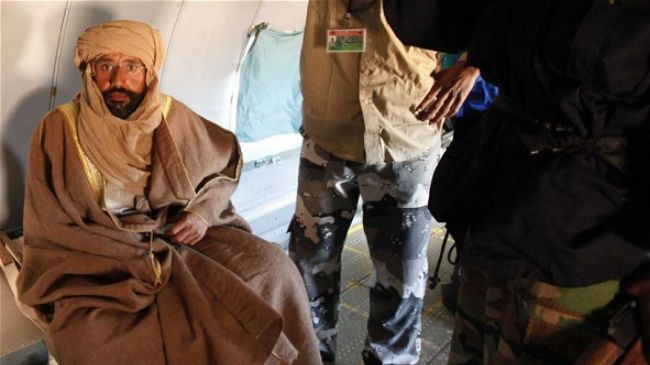Libya Promises A Fair Trial For Saif al-Gaddafi At Home

The International Criminal Court opened a two-day hearing on Tuesday as to where Saif al-Gaddafi, the eldest son of deceased Libyan dictator Muammar Gaddafi, will stand trial for war crimes.
Gaddafi, 40, is charged with crimes against humanity. He has been held in the town of Zintan in the western mountains of Libya since his arrest in November 2011. Libyan authorities, and particularly the Zintan fighters, who are fiercely anti-Gaddafi, have refused to hand him over despite repeated requests from The Hague, the Telegraph said.
Libyan authorities assure that he will be given a fair trial, and have already “produced considerable results” from an investigation, Phillip Sands, a lawyer acting for the Libyan government, told the court today.
“There is a wide range of evidence that will constitute an indictment the same as that presented by the ICC's prosecutor," Sands said, according to the AFP.
“The government of Libya is committed to carrying out a fair trial for any ex-Gaddafi government official,” Ahmad Al-Jehani, another lawyer for the Libyan government, told the ICC.
“We will create a judicial system that is fair and this will prove our commitment to the rule of law,” but also insisted that Libya “needs more time” to put up a fair trial.
“Swift justice does not allow for due process,” al-Jehani said.
Gaddafi’s trial had already been postponed in September by five months in order to incorporate possible testimony from former Libyan intelligence chief Abdullah al-Senussi.
Defense lawyers for Gaddafi submitted a written filing requesting that he be tried in The Hague, where he cannot face the death penalty if found guilty. They have cast doubts on whether Libya’s current legal system can give the son of the country’s erstwhile dictator a fair trial, AP said. Gaddafi’s lawyers are expected to argue heavily for letting The Hague court try him.
The court-appointed defense lawyer Melinda Taylor told reporters last July that she did not expect Libya to give Gaddafi a fair trial, Reuters said.
However, the lawyers might not have as much say as they wish. According to the Rome Statue upon which the International Criminal Court is founded, the ICC is meant to be “complementary to national criminal jurisdictions,” meaning that it can only exercise its authority if the host country is unwilling or unable to do so -- and only for countries that have either signed or ratified the Rome Statue, or for cases that have been referred from the U.N. Security Council.
Libya has not adopted the Rome Statute, and in fact voted against its adoption in July 1998. And it is certainly chomping at the bit to try Gaddafi. The question remains if they are able.
Musa Alkouni, a political analyst and former member of Libya’s National Transitional Council, told Al-Jazeera that not only is Libya equipped to try Gaddafi, but it would be a huge symbolic victory for the country to be able to try its former oppressors.
"The judicial system is back on track and slowly starting to try all the previous regime's figures, and they are a part of the regime and if one part is missing how can we trace other parts," he said. "So the trial of Saif is important to try all these people and groups as a whole."
But Frederick Wehrey, senior associate in the Middle East Program at the Carnegie Endowment for International Peace, wasn't convinced. "The dismissal of the Prime Minister has politicized everything," Wehrey told IBTimes, referring to yesterday's dismissal of the Libyan Prime Minister after a no-confidence vote. "The problem between the center and the periphery [political parties] is only going to be exacerbated, and trial has become a part of that struggle. My sense is this is not an opportune time for the trial."
Wehrey did say that if the cabinet were to reform, that could show the World that Libya was serious about jusice. "This would be an excellent way to display to the world that they're in the process of consolidating legitimacy," Wehrey said. "The country needs to move forward from there [the cabinet dissolving] and exercise their right to put him to trial."
© Copyright IBTimes 2025. All rights reserved.






















